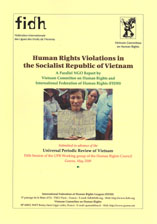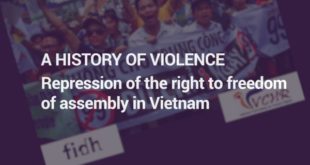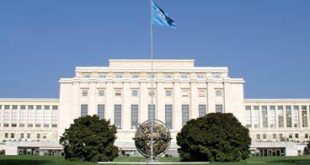Despite Vietnam’s accession to core human rights treaties and its adoption of extensive new legislation, serious gaps remain between international norms and Vietnamese laws and practices. Vietnam continues to adopt laws that restrict the exercise of human rights and imprisons peaceful critics under vague “national security” provisions in violation of its international obligations. Administrative detention, religious repression, crackdowns on human rights defenders, stifling of press freedom, widespread use of the death penalty, are serious concerns, as are abuses of women’s rights, including sex trafficking and coercive birth control policies – Vietnam’s abortion rate is one of the highest in the world.
The FIDH and the Vietnam Committee on Human Rights’ submission to the UPR on Vietnam focuses on several pressing concerns summarized below with relevant recommendations:
- Bring domestic legislation into line with the international human rights treaties to which Vietnam is State party, particularly the ICCPR; close the gap between international obligations and actual practice;
- Revise national security provisions in the Penal Code, seven of which carry the death penalty, and all other laws used to suppress peaceful dissent by conditioning human rights on compliance with the interests of the one-Party State. These laws make no distinction between violent acts such as terrorism and acts of peaceful expression, and seriously undermine Vietnam’s constitutional and legislative framework for protecting human rights;
- Release all prisoners detained merely for the peaceful exercise of their rights to freedom of religion, expression, association or peaceful assembly in violation of the ICCPR;
- Revise Article 80 of the Penal Code on “espionage” which extends not only to State secrets but to “other information and materials” and is widely used to suppress citizens expressing views over the Internet. This article carries the death penalty as maximum sentence;
- Abrogate Ordinance 44 which legalizes detention without trial; abolish the “legal limbo” created by unlimited pre-trial detention, probationary detention and the practice of house arrest on “oral orders” with arbitrary restrictions on freedom of movement and communication;
- Abolish the three-fold control mechanism of the household registration permit (ho khau), precinct security warden and curriculum vitae which creates obstacles for rural-to-urban migrants in accessing education, health and other social services and is used to discriminate against religious, political and ethnic monitory groups;
- Cease censorship by repealing articles in the Press and Publications Laws, as well as Decrees on the Internet and Blogs that restrict freedom of expression and the press; authorize the publication of independent newspapers;
- Re-establish the legitimate status of the Unified Buddhist Church of Vietnam (UBCV) and all other non-recognized religious organizations and guarantee their full freedom of activity;
- Allow the establishment of independent political parties and abrogate legal provisions that could impede their scope of activities, notably Article 4 of the Constitution on the mastery of the Communist Party;
- Revise the Labour Law to reduce restrictions on the right to strike; authorize the establishment of free trade unions outside the Communist Party’s Vietnam Confederation of Labour;
- Revise Decree 88 on Associations in order to allow the establishment of independent civil society outside the framework of the Communist Party and the Vietnam Fatherland Front;
- Reduce sentences that incur the death penalty, cease classifying statistics on executions and death sentences as “State secrets” and move towards the abolishment of capital punishment;
- Improve women’s rights by enforcing anti-trafficking legislation, ceasing coercive birth control by abortion, and implementing provisions in the Land Law that ensure women’s entitlement to the right to land;
- Cooperate with international human rights mechanisms by extending a standing invitation to the UN Special Rapporteurs on Human Rights Defenders, Freedom of Expression, Freedom of Religion and Belief, and the UN Working Group on Arbitrary Detention; allow the participation of independent Vietnamese voices in international mechanisms.
 Quê Me Quê Me: Action for democracy in Vietnam & Vietnam Committee on Human Rights
Quê Me Quê Me: Action for democracy in Vietnam & Vietnam Committee on Human Rights



